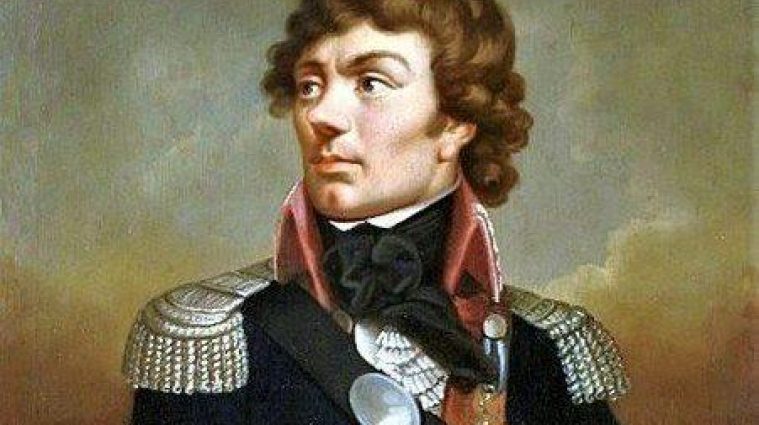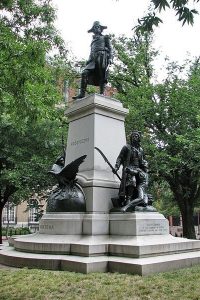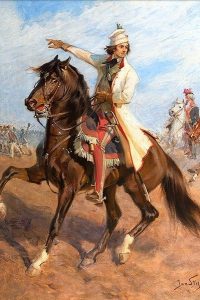Polishness and #BlackLivesMatter – the surreptitious legacy of General Tadeusz Kościuszko
The murder of George Floyd at the hands of Minneapolis police, which took place on May 25, 2020, reverberated throughout the world, exemplifying the ongoing systemic injustice against the people of color in the United States. Even amidst the coronavirus pandemic, Floyd’s tragic death took over headlines not only in the US, but progressively also in many other countries all over the world.
 WikimediaCommons
WikimediaCommonsOne in the line of many acts of racial discrimination and police brutality, Floyd's death became the catalyst, a proverbial straw that broke the camel’s back, causing uproar of many communities and uniting them in protests and marches opposing the systemic dispossession and bias that persists again the people of color. The protests, some escalating to the point of riots, spilled over from the US as the dramatic event unified masses of people representing all walks of life, and coming from different economic and ethnic groups, taking up Floyd’s last words: “I can’t breathe” as their anthem in decisively demanding the end of the prejudice that facilitated his death. Canada, Germany, France, Norway, UK, and the Netherlands, among many others were marked by large-scale protests while politicians, activists, and academics issued statements supporting the protesters and solidarizing with the discriminated groups. Many begun to question their own political systems and national norms, coming to the uncomfortable understanding that the racially-led divisions in access to and procedures of justice are consistently and unquestionably skewed against the people of color. Yet among the strong voices recognizing the racist systemic tendencies of many states, or in the least honoring the horrid event of Floyd’s killing and acknowledging the problematic reality that has allowed it to happen, one country’s voice remained subdued.
Poland, demographically known as one of the most ethnically homogenously ‘white’ (as well as anti-migration and conservative) European states, remained conspicuously quiet on the matter. While many political groups and (inter)national NGO’s continue to point to the Polish state’s systemic inequality and worrisome racial injustice, the topic of George Floyd’s murder and its implications briefly appeared in the media only as a mention of risk-posing acts of looting within the US. On social media and in the news some of the more right-wing oriented politicians and social critics often openly ridiculed the Black Lives Matter movement, distancing Polish reality from the events, judging it irrelevant and overall unimportant. The one act that seemed to resonate with most of the Poles was the so-called vandalism of the statue of Tadeusz Kościuszko, a Polish General, recognized as the ultimate Polish freedom fighter of the 18th century. Kościuszko is considered to be one of the greatest national heroes, and a unequivocal symbol of Polishness cherished beyond partisan divisions. Polish President Andrzej Duda, as well as many other prominent figures of the Polish political scene, have openly condemned the ‘devastation’ of the statues of Kościuszko, one in the US, and another one in Warsaw, on which the ‘#BLM’ has been written by unknown individual(s). Brushing over any potential legitimacy of the protests, or the possible link between their cause and Kościuszko himself, the writing was swiftly removed, and the perpetrators warned not to repeat the offense under heavy penalty.

But who was Tadeusz Kościuszko, and why was his statue the one adorned with the ‘Black Lives Matter’ slogan? According to several historians, the selection of his image by the protesters and the Black Lives Matter movement sympathizers was by no means an accident. Kościuszko (1746-1817) was a renowned military hero, a skilled soldier, whose wits and bravery made him famous in late 18th century’s fights for independence of two different countries: Poland and the United States. Of Polish origin and educated in France, Kościuszko took part in the American Revolutionary War, during which his strategic planning and the devotion to the cause led to him being recognized as one of the war’s biggest heroes. Awarded various medals, prizes, an estate and even an honorary U.S. citizenship, Kościuszko reportedly also became close friends with Thomas Jefferson, making the American President an executor of his last will. In Poland, Kościuszko led an uprising in the aftermath of the ‘partitions’ of 1773 and 1793, when Poland’s territory, due to its ongoing internal conflicts and the weakening international position, was divided among the rulers of Russia, Prussia, and Austria. These aggressive acts of territorial acquisition left Poland even weaker and more dependent on the three neighboring countries that surrounded what remained of the previously powerful nation. Kościuszko led a military insurrection, later named after him, in a large scale fight to regain the Polish independence. Sadly unsuccessful in his efforts, Kościuszko ended up taken as a prisoner by the Russian military, and his uprising ended without accomplishing the goal of re-instating Polish sovereignty. Despite the failed insurrection, Kościuszko became and remains till today a Polish symbol of an ultimate patriot, an ideological freedom fighter willing to put his life on the line against the odds in an admirable struggle against the oppression.
Yet Kościuszko’s legacy is even greater, and carries a clear socio-political relevance to the Black Lives Matter movement, even though that particular aspect of his story remains widely unrecognized by majority of Poles – and appears especially overlooked by the nation’s current political leaders. Based on his speeches, correspondence, as well as the last will, Kościuszko was an avid abolitionist, condemning slavery and racial prejudice. From the times many of his fellow soldiers during the American Revolutionary War were African Americans, Kościuszko opposed ideology of racial subjugation or supremacy of the ‘white’ race: in the instances of being given a slave as a reward for his military achievements, Kościuszko immediately freed the individual in question. By some historians and his contemporaries described as a ‘radical democrat’, Kościuszko believed no human being should be allowed to own another one, and the racial or religious divisions should be irrelevant on the social and political arenas. For him people of African origin as much as whites, Muslims and Jews as much as Christians, peasants just as much as aristocrats and land-owners, and women to the same extent as men, should be included as valid decision-making figures in any society; he also fervently propagated separation of church and state. Reportedly, Kościuszko passionately discussed the issue of slavery and its problematic, amoral nature with Jefferson over the course of many years – both in person and via their correspondence, never wielding in his belief that slavery was absolutely unethical, and that each and every human being, regardless their skin color, deserves to be a fully free, active and equally valuable member of a nation. His ideals are most clearly illustrated by his testament, in which Kościuszko leaves his entire estate to free as many of Jefferson’s slaves as possible, subsequently guaranteeing them the high-level education that would allow the freedmen to successfully re-enter the American society. How disappointed Kościuszko would have been to find out the man he considered a close friend entirely disregarded his last wishes, and in the end none of Kościuszko’s assets were used as the hero intended: Jefferson, who himself owned a southern planation exploiting the labor of many slaves, did not free any of them, and recused himself as the executor of Kuściuszko’s last wishes. Still, a copy of Kościuszko’s will can be viewed among the Jefferson Papers in the Library of Congress in the US, and his last words remain as clear and unquestionable as unbroken and sound was his ideology while he lived: slavery is wrong, all humans deserve to be free and treated equally, regardless their skin color. It is heart-wrenching that the ideals Kościuszko lived by have been disassociated from his legacy and only few appear to remember and honor them by linking his heritage to the still ongoing, contemporary struggle for equality and justice in a stark opposition to racial discrimination.

The recently re-elected Polish President Andrzej Duda, sympathizer of the conservative, populist right wing Law and Justice (PiS) party, visited the US in June, and together with the American President Donald Trump commemorated Kościuszko’s memory by placing flowers at the war-hero’s statue, from which the writing ‘BLM’ has already been removed. President Duda’s trip was widely criticized for numerous reasons, first and foremost for leaving the country in the days before the election took place, a quite unprecedented decision both due to the Coronavirus pandemic, as well as the tradition of the presidential candidates campaigning within the country until the actual election day. Still, no voices were heard pointing to the hypocrisy of apparent recognition of Kościuszko and of his accomplishments by the two people who so single-mindedly oppose the BLM movement, or the reality of racial discrimination permeating the countries they lead politically. As a well-known historian said, it is a shame we forgot what ideals Kościuszko really fought for, and removing the BLM from his statue is a dishonor to everything he stood for: If Kościuszko was alive today, he would be in the first line of protesters, standing in full solidarity with the Black Lives Matter movement and against the systemic violence that unjustly murdered millions, and among them, George Floyd.


